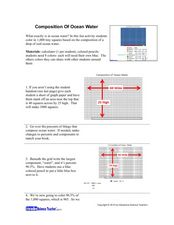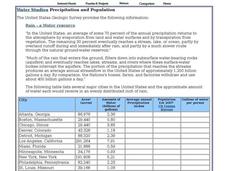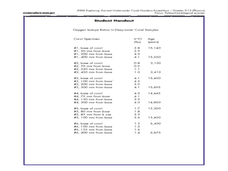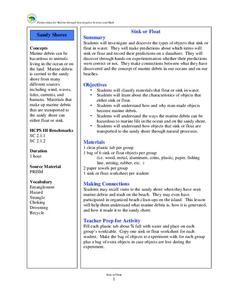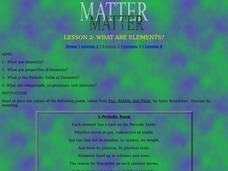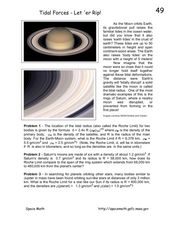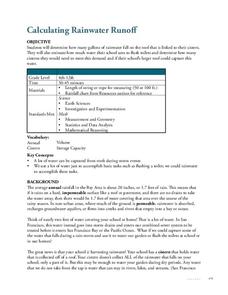Curated OER
Composition of Ocean Water
Students experiment to determine the composition of ocean water. In this ocean water composition lesson, students color in a grid that shows the percentage of each of the components of ocean water which include chloride, sodium, sulfate,...
Curated OER
Water Studies: Precipitation and Population
In this water worksheet, students complete the chart about precipitation and population and answer short answer questions. Students complete 14 rows in the chart and answer 4 questions.
Curated OER
How Much Ocean?
In this ocean learning exercise, students are given a map of the world and they predict the amount of water that covers the Earth's surface. They count the total number of squares on the given map that represent the water and they land...
Curated OER
The Sun as the Driving Force of the Water Cycle
Learners study the water cycle and how the sun is an important factor. For this water cycle lesson students investigate how to desalinate water and explore the different densities of fresh versus saltwater.
Curated OER
How can deep-water corals be used to determine long-term patterns of climate change?
Students explore the concept of paleoclimatological proxies. In this paleoclimatological proxies lesson, students explain isotope ratios in deep water coral samples. Students write a paragraph about global climate change as it effects...
Curated OER
Is the Hudson River Too Salty to Drink?
Learners explore reasons for varied salinity in bodies of water. In this geographical inquiry lesson, students use a variety of visual and written information including maps, data tables, and graphs, to form a hypothesis as to why the...
Curated OER
Water on Planetary Surfaces
In this water on planetary surfaces worksheet, students read about the Galileo spacecraft and the surface of Jupiter's moon Europa. They read about the energy needed to keep the water in a liquid state on Europa. Students solve 4...
Curated OER
Explore the Ocean
Students explore the oceans from their origin. In this oceans instructional activity, students read and discuss excerpts from the Book of Genesis regarding the creation of the ocean. Students then clean up a mock oil spill, measure the...
Curated OER
Water Pressure - Observing Water Flow
Students discover that pressure increases the deeper the ocean becomes. They determine how water pressure differs at various depths by observing water flow.
Curated OER
Water Density Boundaries
Students create observable layers in water that represent a separation based upon density differences. They model density boundaries using differences in temperature and salinity. They, in groups, perform a meaningful experiment...
Curated OER
NUMB3RS Activity: Where’s the Source? Episode: “Undercurrents”
Several real-world problems are posed as a way to learn about vector fields in order to make some predictions after analyzing the data. The main problem comes from the tv show NUMB3RS and is based on solving a crime where a body has...
NOAA
Sustaining Our Ocean Resources
Lead young scientists on an investigation of fishery practices with the final installment of this four-part unit. Using a PowerPoint presentation and hands-on simulation, this lesson engages children in learning how fish populations are...
Curated OER
Sink or Float
Students explore water properties by conducting a class experiment. In this buoyancy activity, students make predictions as to whether or not specific objects will sink or float in water. Students conduct the experiment and record their...
Curated OER
What Are Elements?
Students investigate elements by by defining scientific terms. In this Periodic Table of Elements lesson, students utilize a glass of water, and powdered fruit drink to perform a lab activity demonstrating properties of certain...
Curated OER
Tidal Forces-Let'er Rip!
In this tidal forces instructional activity, students read about the gravitational pull from the moon that causes the ocean tides. Students solve 3 problems including finding the Roche or the tidal radius for the Earth and Moon,...
Techbridge Curriculum
Calculating Rainwater Runoff
Thirsty plants soak up every bit of a rainfall, but what happens to the rain that hits the roof? Calculate the amount of rainwater from your school's roof with an Earth science activity, which brings measurement skills, observation...
Curated OER
Dolphins
Students explore sea life. In this cross curriculum fine arts, science, and P.E. "dolphins" lesson, students sing songs and play games about dolphins, perform water experiments, create mosaics, and use their five senses to explore sand...
Curated OER
Wave Math
Students identify the different factors affecting the size and shape of ocean waves. In this math lesson, students calculate wave speed and wavelength given a mathematical formula.
Curated OER
NUMB3RS Activity: Riding the Waves
High schoolers use the TI-Navigator system to explore vector fields and make predictions. They also identify what a vector field is and that it represents the movement of water. Pupils try to determine where a bottle floating might have...
Curated OER
Hurricane Frequency and Intensity
Students examine hurricanes. In this web-based meteorology lesson plan, students study the relationship between ocean temperature and hurricane intensity. They differentiate between intensity and frequency of hurricanes.
Curated OER
How Oceans Affect Climate
Students draw conclusions about how the ocean affects temperature. In this weather lesson, students use the Internet to gather data to help them come to a conclusion about how the climate in a certain region is directly affected by the...
Ocean Explorer
Living with the Heat
Young oceanographers study the Submarine Ring of Fire, which is a series of deep-water volcanic vents that come up from the ocean floor. Learners take a close look at the unique ecosystems that are associated with these areas, how these...
Curated OER
Oceans of Fun
Here is a great hands-on activity that should lead to a greater understanding of salt water, why the ocean is salty, and how ocean waves are formed. This terrific, old-school lesson has clearly described activities, and all of the...
Curated OER
Sink or Float?
Learners predict and explore to discover which objects sink or float in fresh and salt water, predict how salt affect objects, write predictions on T chart, discuss difference between man-made and natural waters, and graph results.
Other popular searches
- Ocean Water Cycle Diagram
- Ocean Water Chemistry
- Movement of Ocean Water
- Ocean Water Cycle
- Properties of Ocean Water
- Desalination of Ocean Water
- Ocean Water Purification
- Ocean Water Salty
- Ocean Water Pollution
- Ocean Water Pressure
- Composition of Ocean Water
- Water Pollution Ocean Debris


